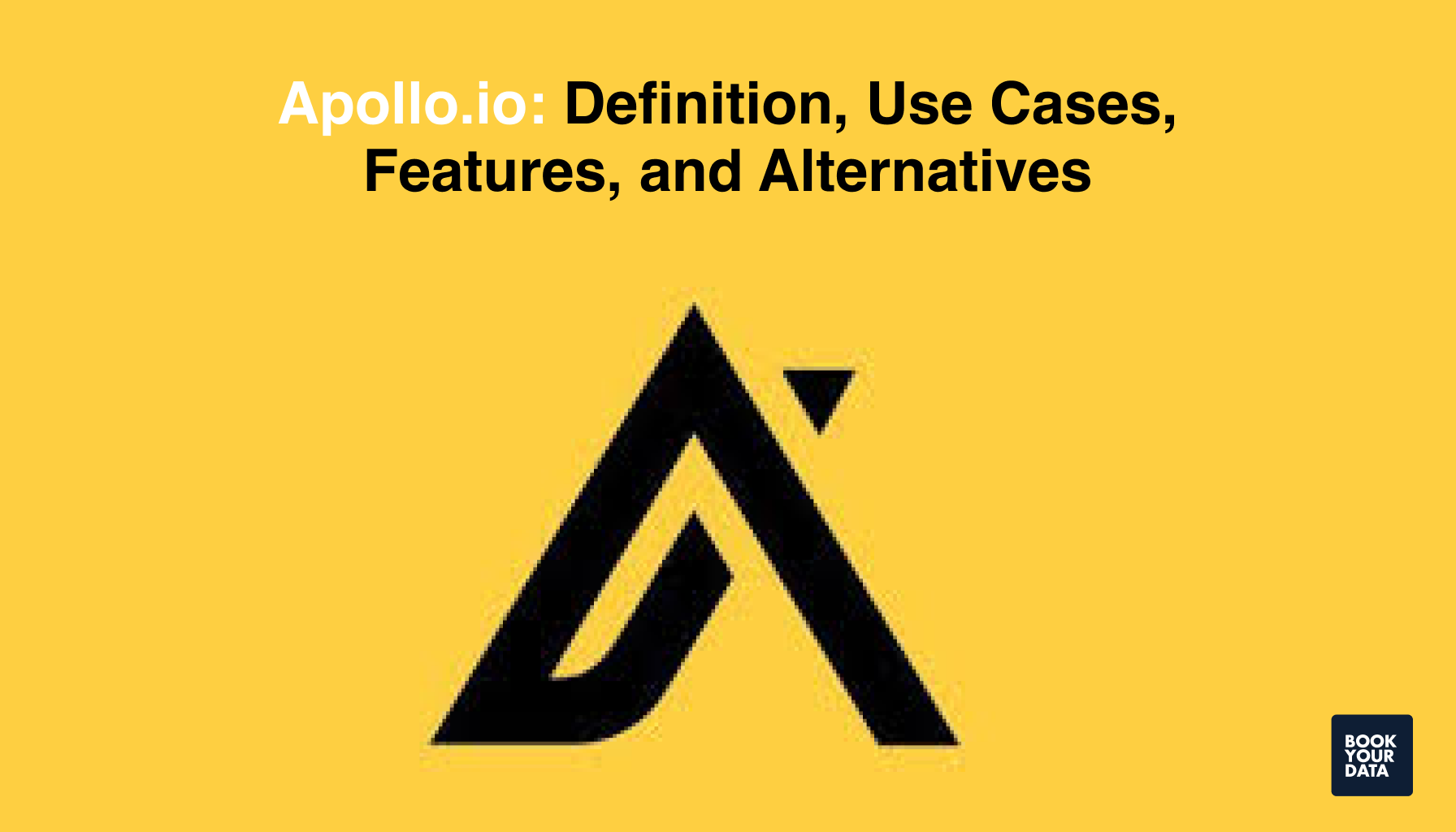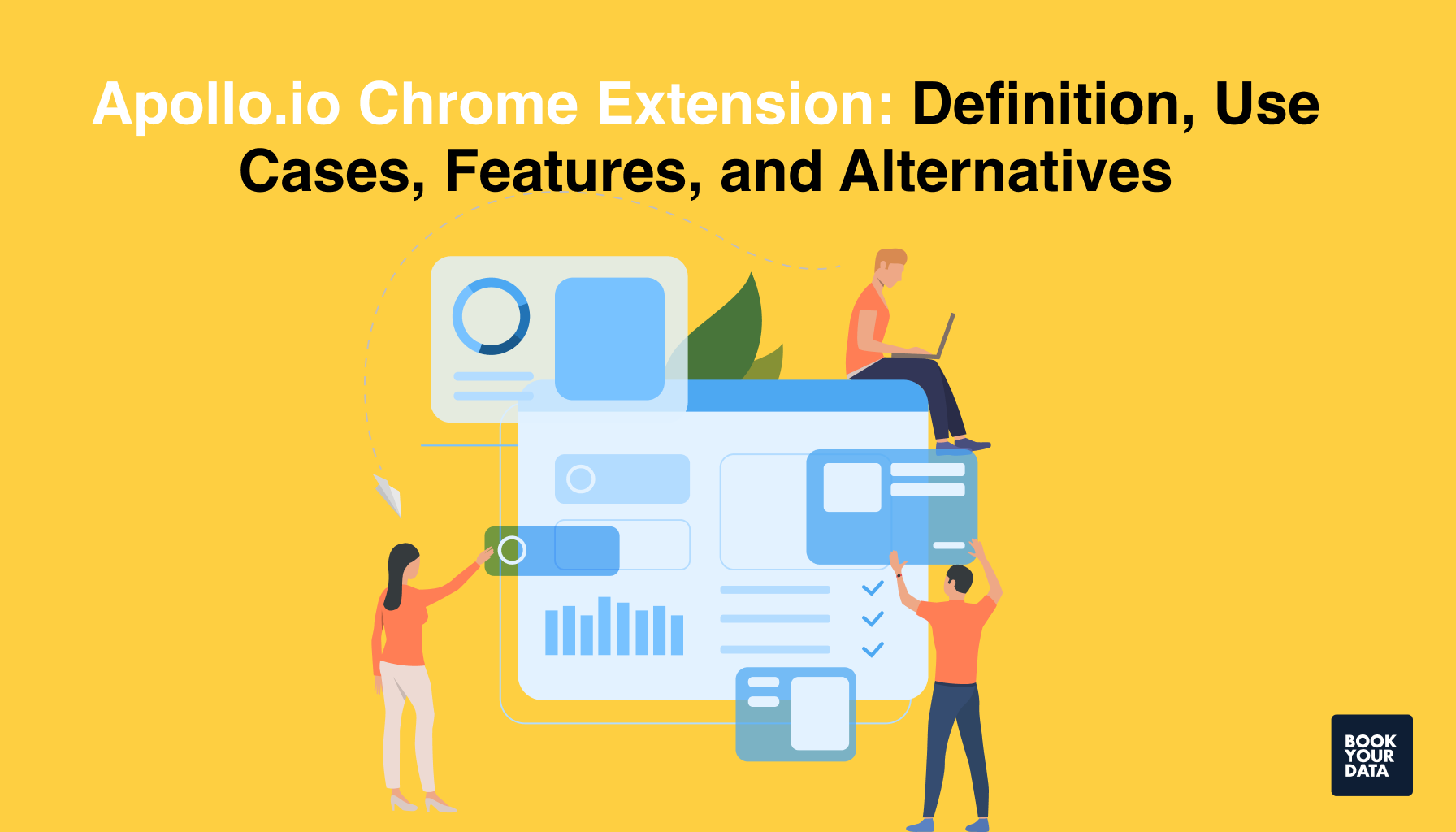Listkit vs Apollo.io: Definitions, Features, Similarities, and Differences
ListKit is a lead generation platform that is designed to help users build targeted B2B email lists by using AI to find verified contact information. It is known for giving users accurate lead lists based on their ideal customer profile or ICP without needing to search or filter manually.
Apollo.io is a more advanced full-scale sales intelligence platform that offers tools for lead generation, email sequencing, CRM integration, and intent-based outreach. It gives users access to millions of business contacts across various industries and lets them search for leads, run campaigns, and even connect it to their CRM.
The features of LisKit are curated lists, high-quality data, triple verification, compliance with GDPR and CCPA regulations, and AI-powered lead matching.
The features of Apollo.io include over 200 data points, automated email sequences, data enrichment capabilities, browser extension for LinkedIn integration, compatibility with CRMs like Salesforce and HubSpot, and intent data and buying signals.
The similarities between LisKit and Apollo.io are B2B lead generation services, access to extensive contact databases, data enrichment features, built-in email verification, GDPR and CCPA compliance, and user-friendly interfaces.
The differences between LisKit and Apollo.io are target audience, platform capability, data accuracy, pricing models, integration capabilities, and ease of use.
ListKit vs Apollo comparison
Bookyourdata the Best Alternative to Apollo and Listkit
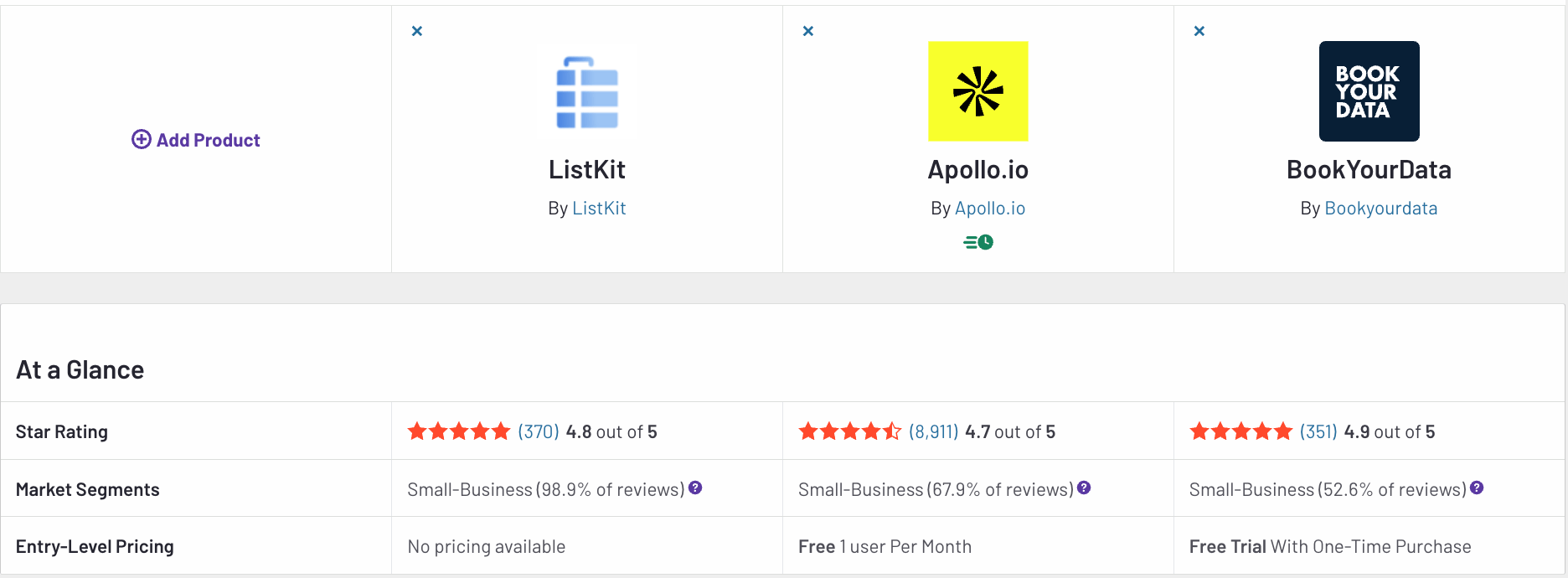
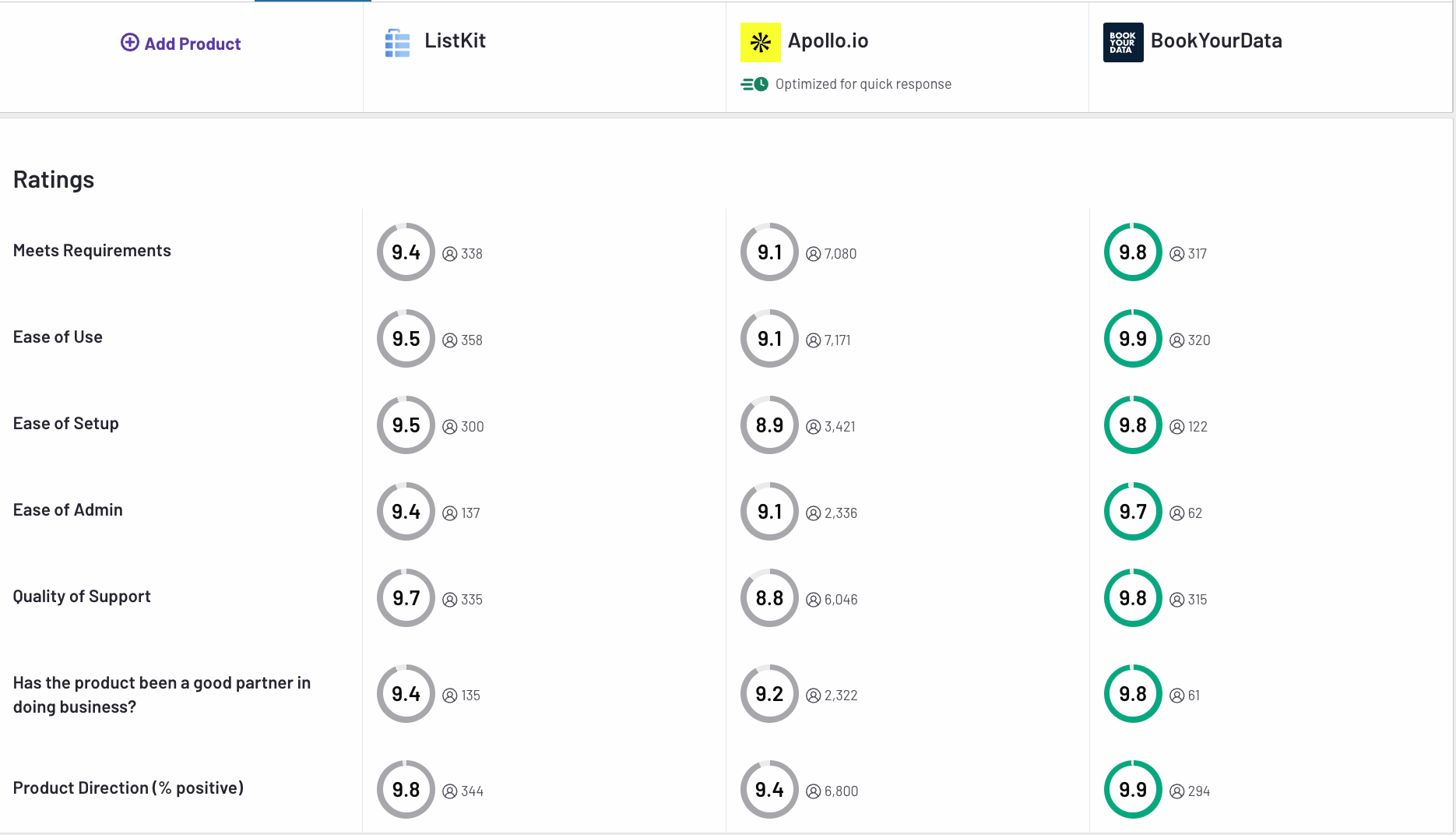
What is ListKit?
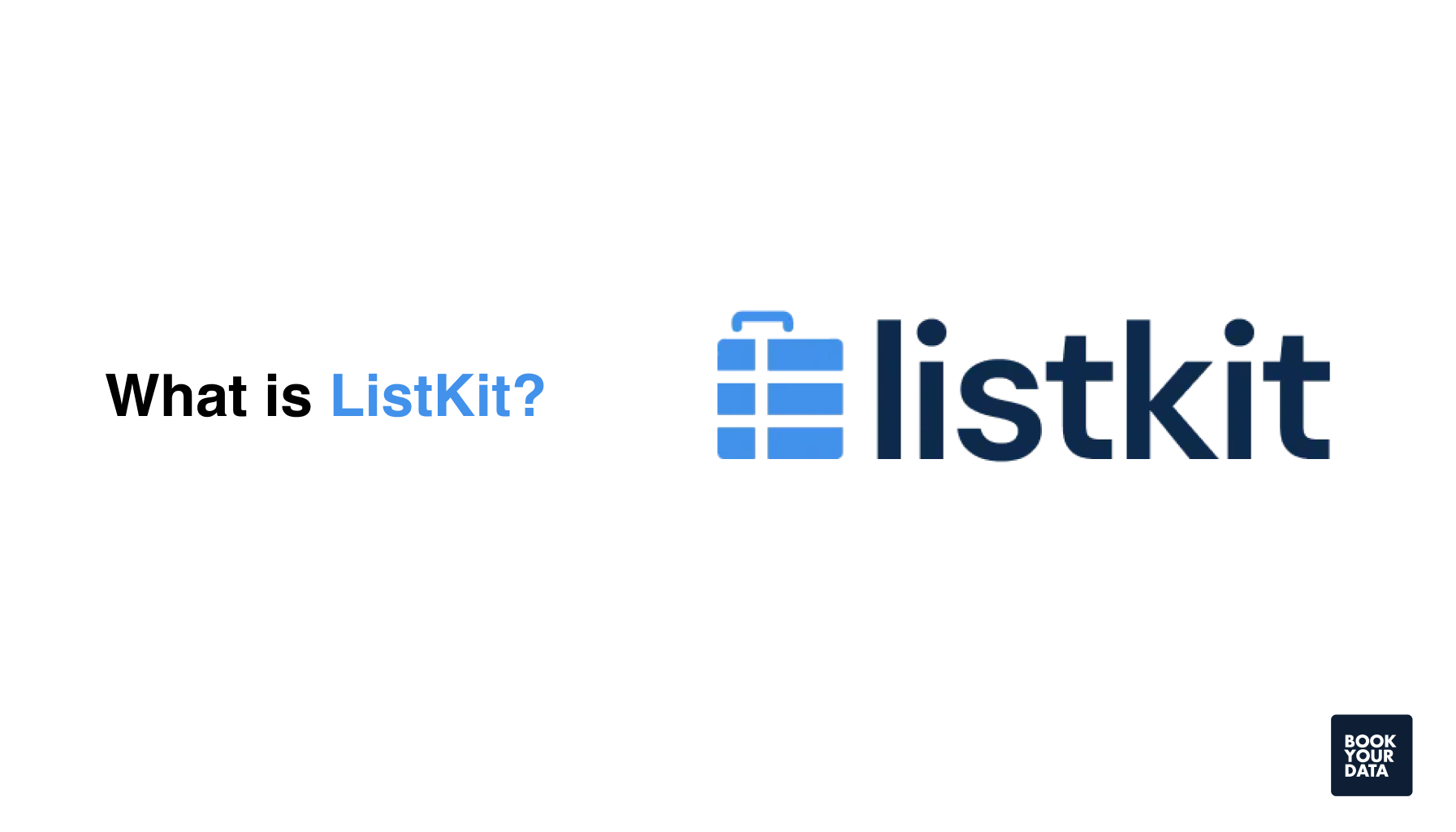
ListKit is a B2B prospect database and lead generation platform that helps users quickly export verified email prospects for email outreach campaigns. It focuses on delivering high-quality, targeted B2B leads with triple-verified contact information, ensuring accuracy and improving deliverability rates.
The platform is mainly built for sales teams, founders, and agencies that want to spend less time researching and more time reaching out to leads. It even offers search filters like industry, company size, job title, location, and more.
The platform gets its data from various sources like public web data, proprietary sources, and partnerships with reliable data vendors. It also runs each contact through a triple-verification process, checking for email validity, domain health, and activity status before delivering the data to the user.
What is Apollo.io?
Apollo.io is a sales intelligence platform that provides users with access to a vast global database of over 210 million contacts. It is built to support every stage of the B2B sales process with advanced search filters, automated outreach tools, and seamless integrations with popular CRM tools like Salesforce, HubSpot, and Pipedrive.
Trust & Compliance Consideration: As of early 2025, Apollo.io’s LinkedIn company page was delisted due to reported violations of LinkedIn’s data use policies. While this doesn’t directly impact feature sets or usability, it introduces valid concerns around compliance and platform longevity. Businesses comparing tools like Listkit and Apollo.io should consider not just functionality and pricing, but also the long-term reputational and policy risks tied to their chosen provider.
This platform is important for companies because it streamlines the lead generation and sales outreach process, helping them grow faster by automating repetitive tasks. Apollo.io gathers its data from public sources, proprietary scraping technology, user-contributed updates, and data partnerships.
Apollo.io is considered a highly valuable tool as it provides all-in-one functionality and replaces multiple tools with a single platform that handles prospecting, outreach, and analytics. This makes it a powerful solution for sales teams that want scalability, precision targeting, and automation all in one place.
What are the features of Listkit?

The features of LisKit are curated lists, high-quality data, triple verification, compliance with GDPR and CCPA regulations, and AI-powered lead matching.
These features are described below.
- Curated lists: Curated lists mean that LisKit builds custom lead lists based on your ICP (Ideal Customer Profile). Instead of searching through a database, it delivers handpicked leads that are customized to the industry, job titles, and company size you provided.
- High-quality data: High-quality data means that the platform provides premium B2B data by focusing on decision-makers and relevant roles within targeted companies. This improves the chances of connecting with the right leads, and the users don't have to search through a large number of emails.
- Triple verification: Triple verification means that LisKit runs every email through a three-step verification process to ensure validity and accuracy. This reduces bounce rates and protects your domain reputation during the email outreach process.
- Compliance with GDPR and CCPA regulations: Compliance with GDPR and CCPA regulations means that the platform fully follows global data protection laws like the General Data Protection Regulation or GDPR and the California Consumer Privacy Act or CCPA, making it safe for use in regulated regions.
- AI-powered lead matching: AI-powered lead matching means that the platform uses Artificial Intelligence to scan and match the most relevant contacts based on the user’s criteria. This reduces the need for manual research and makes the outreach process shorter.
What are the features of Apollo.io?
The features of Apollo.io include over 200 data points, automated email sequences, data enrichment capabilities, browser extension for LinkedIn integration, compatibility with CRMs like Salesforce and HubSpot, and intent data and buying signals.
These features are described below.
- Over 200 data points: Over 200 data points means that Apollo.io provides detailed contact and company information, including job titles, location, revenue, tech stack, and hiring trends for accurate and precise lead targeting.
- Automated email sequences: Automated email sequences mean that the platform allows users to create multi-step email outreach campaigns with built-in tracking for opens, clicks, and replies. These sequences save time and improve consistency during the follow-up process.
- Data enrichment capabilities: Data enrichment capabilities mean that Apollo.io can enrich your existing data, like contact lists, by filling in missing information like phone numbers, emails, and company insights better and faster than most Apollo.io competitors, such as ZoomInfo, ListKit, and Lusha.
- Browser extension for LinkedIn integration: A Browser extension for LinkedIn integration means that Apollo.io's Chrome extension lets you gather verified contact data directly from LinkedIn profiles and company websites while you are simply just browsing.
- Compatibility with CRMs like Salesforce and HubSpot: Compatibility with CRMs like Salesforce and HubSpot means that Apollo.io can easily work natively with major CRMs. This allows you to sync leads, activities, and campaign results without manual entry.
- Intent data and buying signals: Intent data and buying signals mean that Apollo.io allows advanced users to access intent signals to identify leads at all times while they are researching specific topics or tools. This helps them prioritize the leads who are more likely to convert into customers or clients.
What are the similarities between Listkit and Apollo.io?
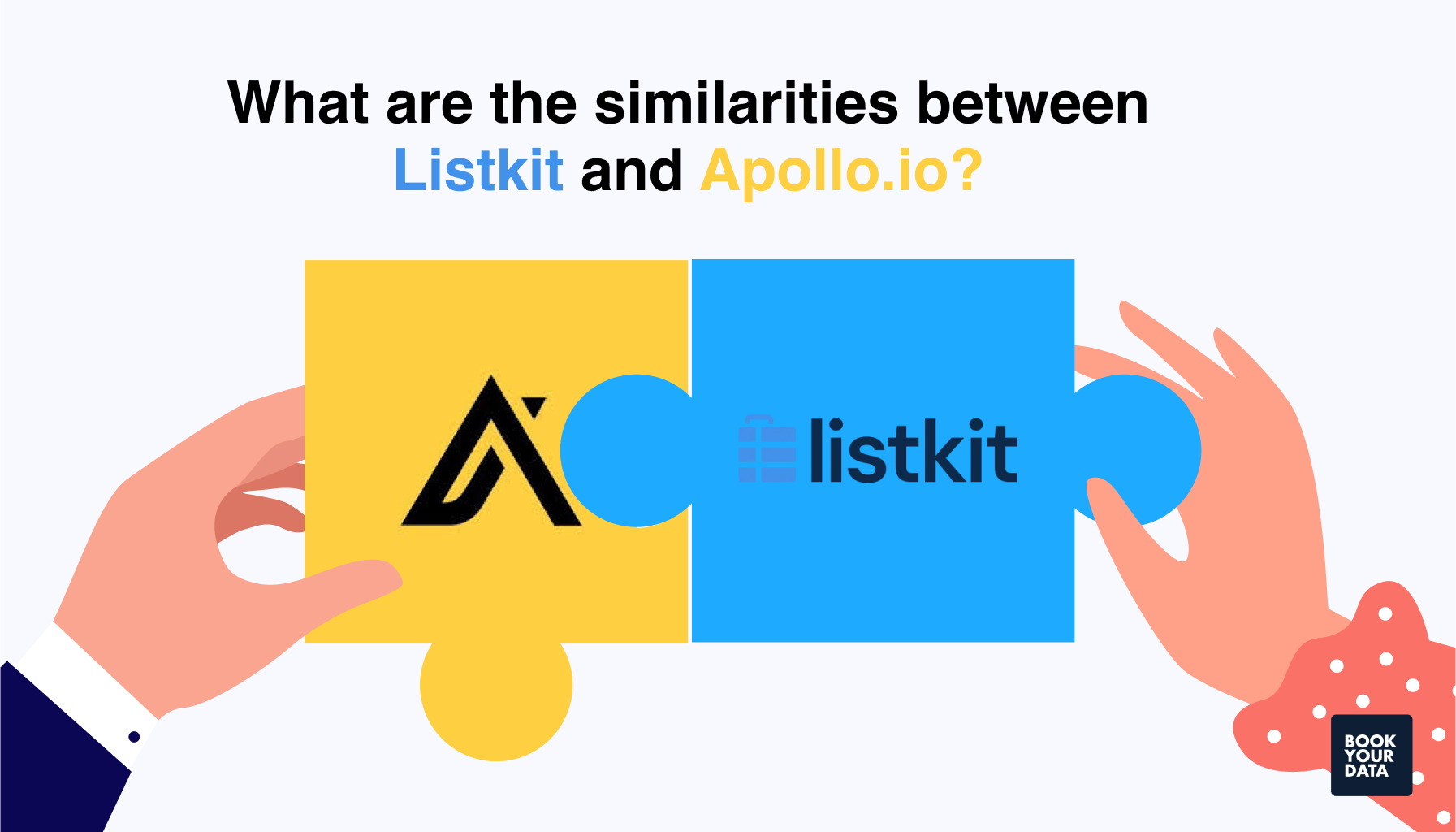
The similarities between LisKit and Apollo.io are B2B lead generation services, access to extensive contact databases, data enrichment features, built-in email verification, GDPR and CCPA compliance, and user-friendly interfaces.
These similarities are described below.
- B2B lead generation services: B2B lead generation services mean that both platforms help users find and connect with business contacts and leads for outreach campaigns. They provide tools to build lists that are customized and appealing to industries, roles, and company attributes.
- Access to extensive contact databases: Access to an extensive contact database means that both offer large databases full of contact information, with Liskit providing over 600 million triple-verified contacts and Apollo.io with around 210 million contacts.
- Data enrichment features: Data enrichment features mean that both Liskit and Apollo.io can change or verify information on existing lists, like emails, phone numbers, company firmographics, and technological stack details.
- Built-in email verification: Built-in email verification means that both platforms take measures to ensure the validity and accuracy of the contact information they provide. ListKit’s triple-step process validates emails before delivery, while Apollo also uses various verification processes.
- GDPR and CCPA compliance: GDPR and CCPA compliance mean that both platforms follow data protection protocols provided by GDPR and CCPA to keep the user’s data secure.
- User-friendly interfaces: User-friendly interfaces mean that each platform has simple and straightforward websites that are easy for users to navigate and understand. ListKit is famous for its simplicity, and Apollo.io for its polished and bug-free user interface.
What are the differences between ListKit and Apollo.io?
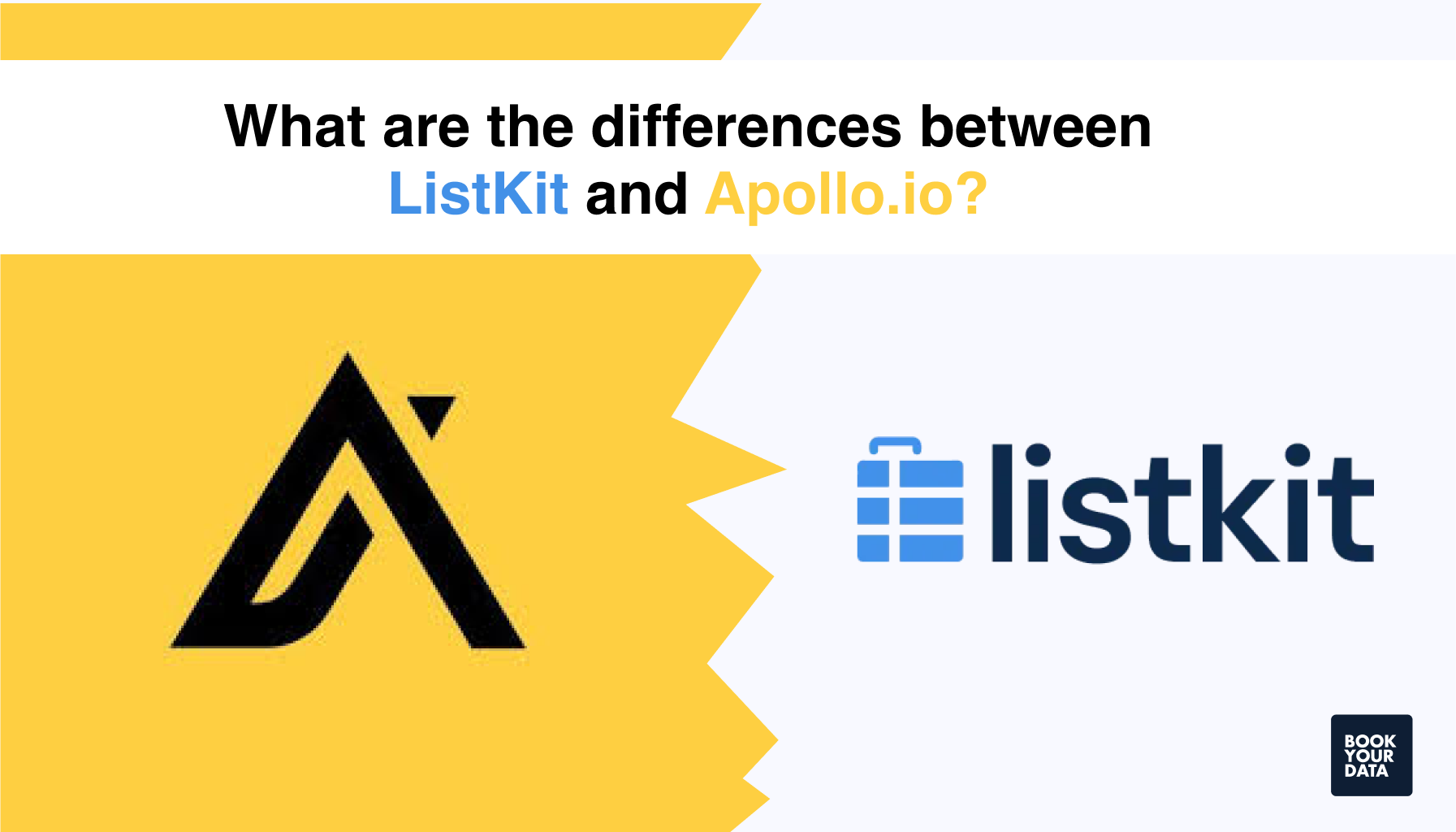
The differences between LisKit and Apollo.io are target audience, platform capability, data accuracy, pricing models, integration capabilities, and ease of use.
These differences are described below.
- Target audience: Target audience means that ListKit is ideal for startups, founders, and small companies who want high-quality leads without complexity. On the other hand, Apollo.io is popular among sales teams and larger businesses that need advanced automation, prospecting, and engagement tools.
- Platform capability: Platform capability means that ListKit only focuses on lead generation and hand-built lists with triple-verified emails, and does not focus on email sequencing, CRM automation, or conversation analytics. Apollo.io offers deeper capabilities like auto email/LinkedIn sequences, intent data, conversation intelligence, call transcription, and A/B testing.
- Data accuracy: Data accuracy means that ListKit maintains around 626 million triple-verified contacts with high accuracy and low bounce rates, whereas Apollo.io has a larger general database with around 210 million contacts but with slightly lower accuracy.
- Pricing models: Pricing models mean that ListKit uses a simple, credit-based model where you pay per lead, and the credits you purchased simply roll over. Apollo.io follows a subscription model that starts at $49 per month per user, and higher-tier subscriptions give you more features.
- Integration capabilities: Integration capabilities mean that Apollo.io integrates natively with CRM tools like HubSpot and Salesforce. ListKit provides clean CSV exports, but it does not provide native integration with CRM tools.
- Ease of use: Ease of use means that ListKit is a minimal platform that provides a fast and beginner-friendly user interface. On the other hand, Apollo.io is very feature-rich, so it can be a bit overwhelming for new users due to its complex setup and sales tool ecosystem.
What is ListKit's database quality?
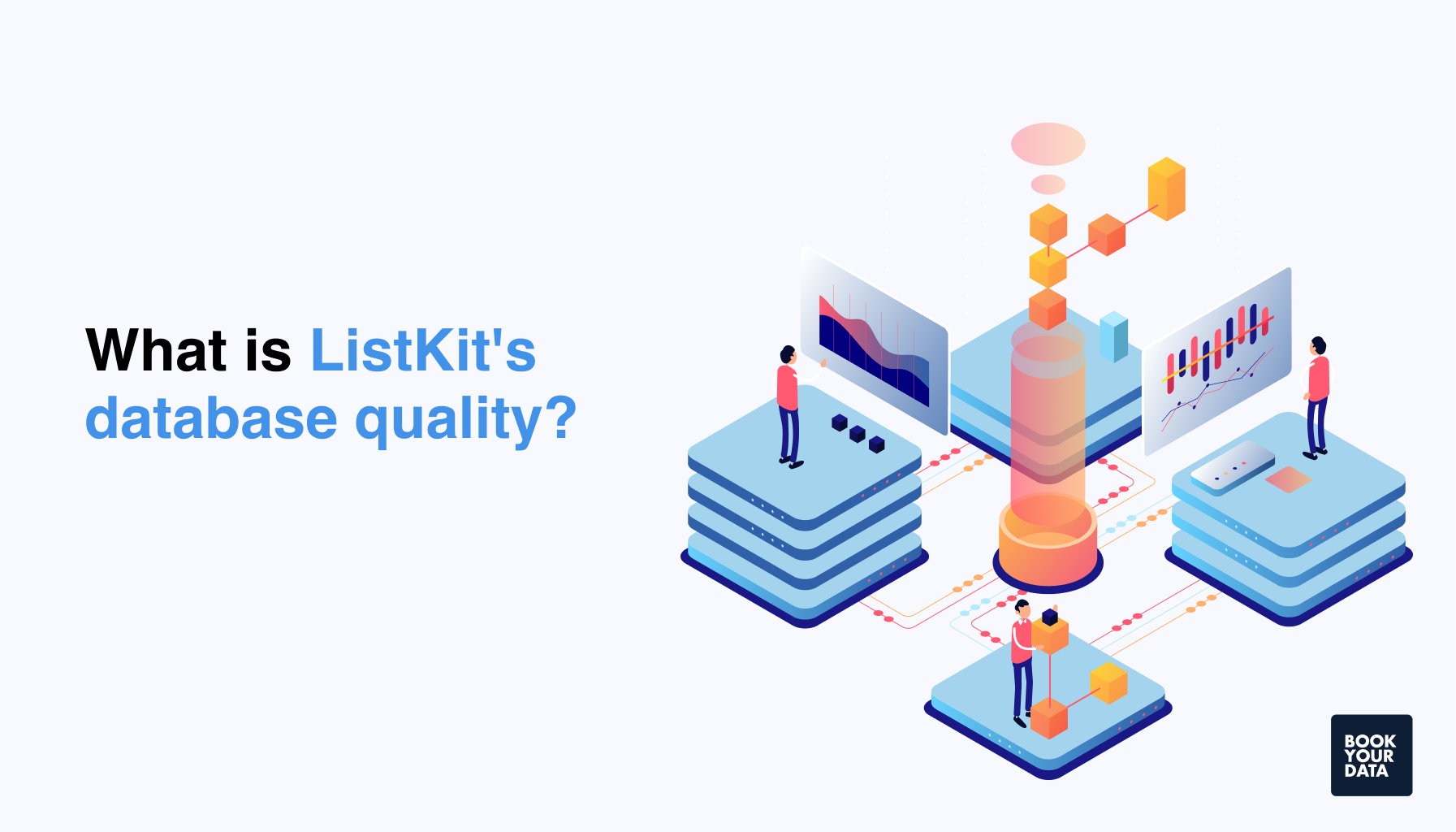
ListKit’s database provides precise and reliable data with over 626 million B2B contacts sourced from trusted public and proprietary data providers. It also has a triple verification process, which checks each contact through three stages, including email format validation, SMTP verification, and activity or deliverability testing.
ListKit also offers hand-built lists based on your Ideal Customer Profile or ICP. This means the leads you receive are not only accurate but also highly relevant to your targeting needs. This platform’s relevant database makes it valuable for users who want to avoid spam traps, protect their email domains, and achieve better engagement rates from their outreach campaigns.
What is Apollo.io's database quality?
Apollo.io’s database is massive, and it provides access to over 210 million contacts and 70 million companies worldwide. It is designed to support scalable B2B outreach by offering rich contact and company profiles with firmographic, technographic, and behavioral data. Apollo.io also claims to have an estimated 90% data accuracy rate, which is strong but not as much as some of the competitors, like UpLead, Hunter.io, and Saleshandy.
Apollo.io’s data quality receives positive user feedback, especially for the depth of information available. Some users have also reported occasional issues with outdated or invalid emails, particularly in smaller markets. Apollo.io includes email verification tools and bounce detection, but it does not offer a refund or credit replacement policy for bounced emails.
What are the differences between the integrations of Listkit and Apollo.io?
The differences between the integrations of ListKit and Apollo are listed below.
- LisKit integrations: ListKit offers limited integrations, but they are important for exporting leads easily. Users can download clean CSV files to manually import into platforms like HubSpot, Lemlist, or Mailchimp. It supports Zapier for connecting to basic tools like Google Sheets or CRMs and provides custom API access on the user’s request.
- Apollo.io integrations: Apollo.io provides strong native integrations with major CRM tools like Salesforce, HubSpot, and Pipedrive, allowing for real-time syncing, enrichment, and automation. It connects with Gmail and Outlook for tracking emails, supports LinkedIn via a Chrome extension, and offers smooth API and webhook support for advanced automation.
What are the pricing plans of Listkit?

The pricing plans of LisKit include the professional plan, scale plan, and enterprise plan.
These LisKit pricing plans are described below.
- Professional plan: The Professional plan starts at $97 per user per month and includes 2,000 email credits, 100 free phone credits, with additional credits at $59 per 1,000 emails. The credits can also roll over monthly and include a 30‑day money‑back guarantee.
- Scale plan: The Scale plan starts at $297 per month or $237 per month if billed annually and includes around 10,000 email credits, 500 phone credits, unlimited email verifier credits, and basic CRM & sending tool integrations. Credits reset monthly and roll over.
- Enterprise plan: The enterprise plan offers custom pricing based on the credits and features you choose. It is best suited for large teams that require bulk credits, custom intent‑data sets, CRM workflows, cold email setup, and a dedicated account manager.
What are the pricing plans of Apollo.io?
The pricing plans of Apollo.io include the free plan, basic plan, professional plan, and organization plan.
These Apollo pricing plans are described below.
- Free Plan: The Free plan includes unlimited email credits, 5 mobile credits, and 10 export credits per month. This plan also has some limitations, as there are not enough bulk outreach capabilities or advanced CRM integrations. It is only useful for testing Apollo.io or for very early-stage prospecting.
- Basic Plan: The Basic plan starts at $49/month and includes 75 mobile credits and 1,000 export credits per month. This plan also includes bi-directional Salesforce integration, full email provider integration, limited buying intent data with up to 6 intent topics, and responsive support.
- Professional Plan: The Professional plan starts at $79/month and includes 100 mobile credits and 2,000 export credits per month. The plan provides users the ability to create 5 customizable dashboards, integrate with CRMs, use 5 mailboxes per user, and access pre-built advanced reports. It also allows selecting 10,000 records at a time and supports unlimited sequences and A/B testing.
- Organization Plan: The Organization plan starts at $119/month and includes 200 mobile credits and 4,000 export credits per month. The plan even offers enterprise-grade features like Single Sign-On or SSO, AI Research Intelligence, call recordings with up to 8,000 minutes, and detailed AI insights.
Listkit vs Apollo: Which one should you choose?
You should choose ListKit if you are looking for a simple solution that provides highly accurate leads, as it provides email lists that are triple-verified and ready for outreach. It also removes the hassle of managing CRM integrations, sequences, or automation. This makes it perfect for founders, agencies, and small teams. ListKit also saves you time and boosts deliverability by providing precision-targeted leads according to your Ideal Customer Profile or ICP.
If you're running a growing sales team and need an all-in-one sales intelligence tool, you should consider using Apollo.io, as it offers a big and searchable database with over 200 data points. The platform also includes automated email and LinkedIn sequences, built-in CRM integrations with tools like Salesforce, HubSpot, conversation intelligence, intent signals, and a powerful Chrome extension.
Bookyourdata is best if you want to buy targeted B2B email lists on demand. It offers a pay-as-you-go model and allows you to filter contacts by job title, industry, and location, without requiring a subscription.

What to consider when choosing between Listkit and Apollo.io?
When choosing between ListKit and Apollo.io, you should consider your team’s size, technical needs, and whether you want simplicity or full sales automation. LisKit provides high-quality leads and is designed for founders, agencies, and small teams who want lead lists without dealing with databases. The triple-verification system also ensures reduced bounce rates, making it ideal for users who want accuracy while saving time and effort.
Apollo.io is a better choice if you want more control over lead discovery, automation, and outreach. It is perfect for sales teams that want to search a massive contact database, run multi-step email and LinkedIn sequences, run CRM records automatically, and track performance metrics all in one platform.
Choose BookYourData if you want targeted B2B email lists on demand. It also offers a pay-as-you-go option to explore the features of this platform without long-term commitments.
Is ListKit better for startups, and Apollo.io for enterprise sales teams?
Yes, ListKit is better for startups that need simple and targeted leads, while Apollo.io suits enterprise teams that need advanced automation and CRM integrations.
Is Apollo.io a better option than ZoomInfo?
Yes, Apollo.io is better than ZoomInfo in many cases, as it is more affordable and offers built-in outreach tools. When it comes to ZoomInfo vs Apollo.io, ZoomInfo has more data, but it is less accurate.
Is ListKit’s triple-verified data more reliable than Apollo.io’s vast database?
Yes, ListKit’s triple-verified data is more reliable than Apollo.io’s vast database, as it ensures higher accuracy and lower bounce rates compared to Apollo.io’s 90% accuracy guaranteed database.
Does Hunter.io’s email verification outperform Apollo.io’s large database?
Yes, Hunter.io’s email verification outperforms Apollo.io’s large database, as Hunter.io specializes in data verification. When it comes to Hunter.io vs Apollo, Hunter’s email verification makes its data more reliable than Apollo’s general contact info database.
Does RocketReach’s focus on contact retrieval offer more value than Apollo.io’s prospecting tools?
No, RocketReach’s focus on contact retrieval does not offer more value than Apollo.io’s prospecting tools. When it comes to RocketReach vs Apollo, Apollo offers better prospecting and automation features, whereas RocketReach is more limited to contact lookup.
Is Apollo.io the best choice for B2B marketing teams?
No, Apollo.io is not the best choice for B2B marketing teams as it has competitors that offer a lot more features and more accurate data at a lower price. Other competitors like Bookyourdata and Zoominfo are better choices as they have more features at lower prices.

Does ListKit’s pricing structure offer better ROI for small teams?
Yes. ListKit’s pricing structure offers better ROI for small teams, as the pay-per-lead and rollover credit system is best suited for startups with limited budgets.
Is Apollo.io’s feature-packed platform worth its subscription cost?
Yes, Apollo.io’s feature-packed platform is worth its subscription cost if you need advanced sales automation, CRM syncing, and database access. The features justify the cost for midsize to large teams.
Still Deciding? Take Bookyourdata for a Free Test Drive
Bookyourdata allows you to download targeted B2B email lists on demand, if you prefer a one-time purchase model instead of a subscription. You can filter by industry, job title, and location, so it is suitable for teams that need quick access to accurate contact data without ongoing platform costs.
[CTA1]
[CTA2]


